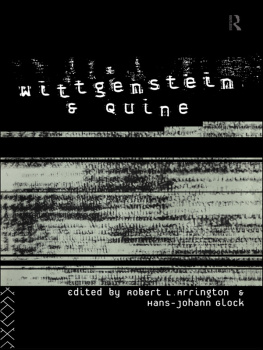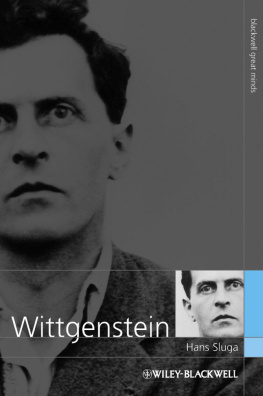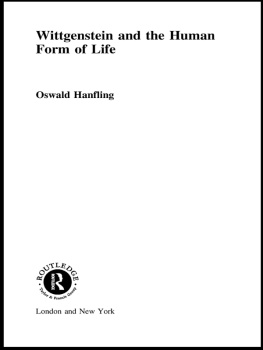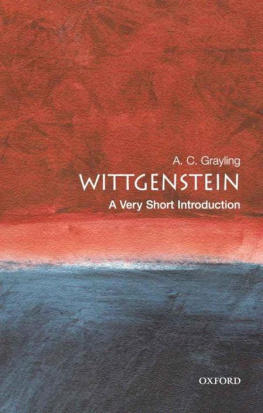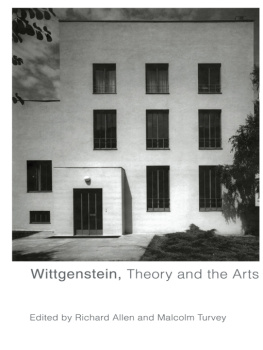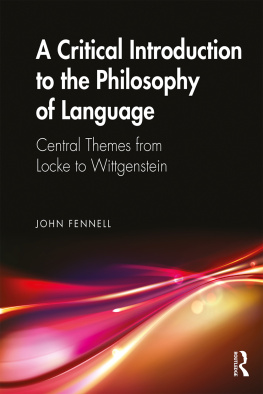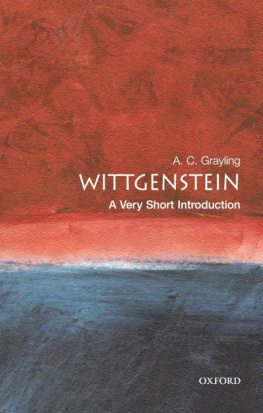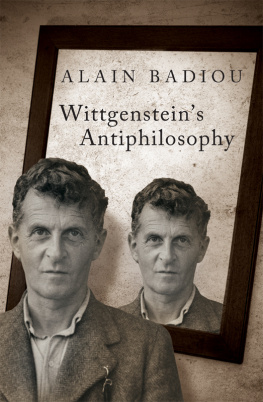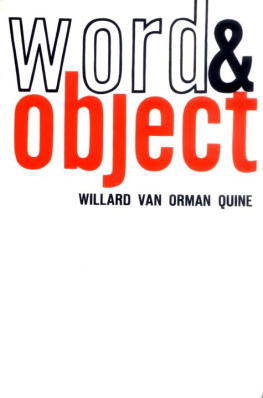This edition published in the Taylor & Francis e-Library, 2003.
All rights reserved. No part of this book may be reprinted or reproduced or utilized in any form or by any electronic, mechanical, or other means, now known or hereafter invented, including photocopying and recording, or in any information storage or retrieval system, without permission in writing from the publishers.
CONTRIBUTORS
Professor Robert L.Arrington, Department of Philosophy, Georgia State University, Atlanta, Georgia
Professor John V.Canfield, Department of Philosophy, University of Toronto
Professor Ilham Dilman, Department of Philosophy, University College of Swansea, Singleton Park, Swansea
Professor Burton Dreben, Department of Philosophy, Boston University, Boston, Massachusetts
Professor Roger F.Gibson, Department of Philosophy, Washington University, St. Louis, Missouri
Dr Hans-Johann Glock, Department of Philosophy, University of Reading
Dr P.M.S.Hacker, St Johns College, Oxford
Professor Christopher Hookway, Department of Philosophy, University of Sheffield
Professor John F.Post, Department of Philosophy, Vanderbilt University, Nashville, Tennessee
Professor Stuart Shanker, Department of Philosophy, Atkinson College, York University, North York, Ontario
Professor Douglas G.Winblad, Department of Philosophy, Vassar College, Poughkeepsie, New York
ABBREVIATIONS
ABBREVIATIONS FOR WITTGENSTEIN'S WRITINGS CITED IN THE TEXT
Abbreviations are given in parentheses in the text. References are to page numbers unless otherwise indicated. Works are listed in order of composition.
ABBREVIATIONS FOR QUINE'S WRITINGS CITED IN THE TEXT
Abbreviations are given in parentheses in the text. References will sometimes be to the title of a collection of essays and sometimes to an individual essay included in the collectionboth the collection and the individual essay will have abbreviations. Books are listed first, next anthologies, then articles. Letters a', ', c' indicate, respectively, 1st, 2nd or 3rd editions. References are to page numbers unless otherwise indicated.
EDITORS INTRODUCTION
Quine and Wittgenstein rank as two of the leading philosophers of the twentieth century. Indeed, in the arena of analytic philosophy, they are arguably the two most important philosophers of the century. Wittgensteins Tractates Logico-Philosophicus (1922) heralded the linguistic turn of twentieth-century analytic philosophy and inspired the logical positivists of the Vienna Circle, while his Philosophical Investigations (1953) was the major force behind the conceptual analysis which dominated anglophone philosophy until the seventies, and continues to stimulate contemporary philosophers. Quine is the most eminent post-positivist philosopher in America; his work marks a decisive watershed in the development of analytic philosophy and inaugurated a move away from both positivism and conceptual analysis. Consequently, a comprehension of the similarities and differences between the philosophies of Wittgenstein and Quine is essential if we are to have an understanding of recent and contemporary philosophical thought. A comparison of the two also leads us right into the heart of current debates in analytic philosophy. In their different ways, both Wittgenstein and Quine have brought out the intimate links between apparently remote topics such as meaning, logical necessity, knowledge, and the nature of philosophy itself.
Whatever their other differences or similarities, it is generally agreed that these two seminal thinkers propose different conceptions of the proper form of philosophical activity. Both reject the idea of a first philosophy, prominent in Plato and Descartes, according to which philosophy, by way of pure ratiocination, provides the foundations for the rest of human knowledge. But what they put in place of this foundationalist picture is strikingly different. Quine views philosophy as continuous with science and denies that there is any distinctive philosophical subject matter or method. For Quine, philosophy, like science, is concerned with matters of fact and is broadly empirical in its methodology, although it is concerned with the most general features of reality (a view that has been welcomed even by some who are hostile to other aspects of Quines philosophy, notably proponents of AI and cognitive psychology). The rationale for this conception of philosophy lies in Quines radical empiricism, which leads him to reject the notion of logical necessity. He maintains that there is no qualitative difference between empirical propositions and the allegedly necessary propositions of logic, mathematics and metaphysics.
By contrast, Wittgenstein insists that the contrast between necessary and empirical propositions is even greater than traditionally assumed. Empirical propositions can be said to describe possible states of affairs, but necessary propositions cannot be said to describe necessary states of affairs. They do not represent either abstract entities inhabiting a Platonic hinterworld or the most general features of empirical reality. Their role is normative, not descriptive. They are what he calls grammatical propositions, which means that they express rules for the meaningful use of words. By the same token, Wittgenstein regards the assimilation of philosophy and science as a major source of philosophical confusion. The task of philosophy is not to describe or explain reality. Rather, it resolves the conceptual confusions which, to his mind, are at the heart of so much traditional and contemporary philosophizing, and it does so by clarifying grammar, the rules of our language.
The methodologies proposed by Quine and the later Wittgenstein are not the only ones to be found in recent and current Anglo-American thought. The form of analysis that the early Wittgenstein proposed in his Tractatus Logico-Philosophicusand close variants of this methodologyis also much in evidence. It is difficult to see, however, how the attempt to discover logical forms hidden underneath the surface of natural languages can be sustained in the light of the penetrating criticisms that both Quine and Wittgenstein, from different directions, aim at it. In our opinion, the main options that ought to be on the menu for philosophers today are the scientific conception of philosophy proposed by Quine and the elucidatory or therapeutic one offered by Wittgenstein. But which one of the two? Philosophers need to come to grips with the conflicting nature of these options.

